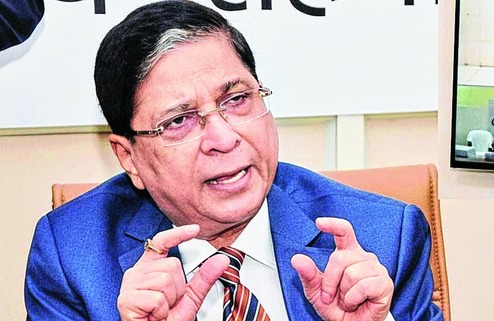
New Delhi: The Supreme Court on Wednesday asserted that the Chief Justice of India was the "master of the roster" who alone had the power to decide on allocation of cases, virtually setting at rest the controversy raised by four of its next senior-most judges.
A bench of Chief Justice Dipak Misra and Justices A.M. Khanwilkar and D.Y. Chandrachud dismissed a plea filed by an Allahabad-based lawyer, saying the Chief Justice was a "repository of constitutional trust" and there couldn't be a "presumption of mistrust".
"From an institutional perspective, the Chief Justice is placed at the helm of the Supreme Court. In the allocation of cases and the constitution of benches, the Chief Justice has an exclusive prerogative. As a repository of constitutional trust, the Chief Justice is an institution in himself," the bench said.
"The authority is entrusted to the Chief Justice because such an entrustment of functions is necessary for the efficient transaction of the administrative and judicial work of the court....
"The entrustment of functions to the Chief Justice as the head of the institution is with the purpose of securing the position of the Supreme Court as an independent safeguard for the preservation of personal liberty. There cannot be a presumption of mistrust," Justice Chandrachud, who wrote the judgment, said.
At an unprecedented media conference on January 12, the four judges had complained of selective allocation of cases to preferred benches. They had also said "senior-most judges" were ignored while cases were allocated.
Constitutional expert and senior advocate Shanti Bhushan too had filed a public interest petition, pleading that only the five-member collegium (the CJI and four senior-most judges) determine the roster collectively.
Bhushan's plea is yet to come up for hearing but the court on Wednesday said there was no question of any change in the existing rules as it dismissed the PIL filed by Asok Pande, the Allahabad-based advocate.
Pande wanted the rules to be amended to ensure that three-judge benches in the Chief Justice's court included two of the other senior-most judges, apart from the CJI. As for constitution benches, his petition said, they should consist of the five senior-most judges, or three senior-most judges and two junior-most judges.
The bench said the Supreme Court Rules, 2013, had been notified with the President's approval and they alone would be the guiding light for the court on allocation of cases and benches.
"The relief which the petitioner seeks is manifestly misconceived.... Similarly, the petitioner is not entitled to seek a direction that benches of this court should be constituted in a particular manner or, as he seeks, that there should be separate divisions of this court...," the bench said.
"There is no constitutional foundation on the basis of which such a suggestion can be accepted," it said.
Any tinkering with the CJI's authority as the master of the roster, the court added, "would intrude into the exclusive duty and authority of the Chief Justice to constitute benches and to allocate cases to them".
The bench said every judge appointed to the top court under Article 124 of the Constitution is invested with the equal duty of adjudicating cases assigned by the Chief Justice.
"Seniority in terms of appointment has no bearing on which cases a judge should hear.... To suggest that any judge would be more capable of deciding particular cases or that certain categories of cases should be assigned only to the senior-most among the judges... has no foundation in principle or precedent.
"To hold otherwise would be to cast a reflection on the competence and ability of other judges...," Justice Chandrachud said.











